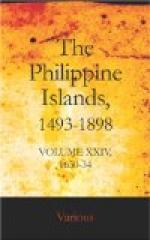“It is a great deal that soothsayers and bonzes, who are so much opposed to us, should speak so in our favor; but the Lord can do much greater things, and as it seems that the portent is His work, [words illegible] the interpretation. The result was that the emperor immediately sent messengers to Nangasaqui and other places to bring to him the fathers who were in prison. They brought from Nangasaqui father Fray Luis, of the Franciscan order; and the father-provincial Christobal Ferreira, and Father Sevastian de Viera, of the Society—the latter having been for a long time a laborer in that church whence he was sent to Rome as procurator. When our father invited him to remain here, as he was so old and had labored so long, he preferred to end his life with the children whom he had begotten in Christ, since they were engaged in such wars, rather than enjoy the peace of Europa. Two years ago he arrived at Manila from Rome; and a little more than a half a year ago he left Manila for Japon, in the garb of a Sangley. But as he was so well known, as soon as he secured an entrance to that country, and the search for the Christians began, more than a thousand agents were sent over the whole kingdom in search of him, so great a desire had they to get hold of him. As they were so numerous, and the reward great, he was unable to escape. He finally was made a prisoner with the other Christians at Nangasaqui, who were awaiting death (it was this that made him go back to Japon); and, although they believed it to be certain when the order came to convey them to court, all were greatly encouraged to suffer it. But, in place of that, the ambassador of Macao who is at that court writes that the kindly treatment which the emperor extended to them was remarkable. He ordered them to be taken from the prisons and spoke to them with much gentleness. He told the fathers that if their faith was such truth as they said, they should obtain from their God the cure of his leprosy, so that he might recognize its truth; and see that he had done wrong in taking the lives of those who followed it. The fathers offered to ask this from our Lord, if his Majesty wished, for the cause was His; and He heard their petitions and our desires. This emperor may be the Constantine of that church, in whom the blood that he shed of so many noble laborers wrought the health which was restored to him; and this made him unwilling to shed the blood of the humble innocents. We hope that this omen has assuaged the persecution, and his health goes far to confirm this. We have the same hope for China, where our Lord has made us so acceptable to the emperor that he has given us one of the study-halls at his court at Paquin. Our fathers are giving lectures to large audiences, and are highly esteemed by all the court, whence springs our hope of founding many colleges in that kingdom. [102] May it please his Majesty to further this.”




